- Home
- Jane Arbor
A Growing Moon Page 3
A Growing Moon Read online
Page 3
Gardens.
‘Which would be cheaper?’ they asked.
‘The steamer—only a few hundred lire.’ Cesare turned to Dinah. ‘You’ll be going with us?’
But a perverse quirk of her will rebelled. She had claimed to him that the twins were capable of taking care of themselves, and this was the time to bear that out.
‘I hadn’t meant to,’ she said. ‘I’ll go over some time not today. I thought that instead I’d like to look in at the office of Plenair—to see where I’ll be working, and to let the manager know I’ve arrived before time.’
Cesare frowned. ‘There’s time enou gh for that, sure ly?’
The frown annoyed her. She dug in her heels. ‘That’s what I’m doing this morning, anyway.’
‘In that case I’ll send Jason and Lesley in the boat with Giuseppe. I shan’t be needing it this morning, and he can see them safely to the Lido and arrange a time to meet them for coming back.’
‘Is that your craft that we saw at your front door?’ asked Jason.
Cesare nodded. ‘The same.’
‘It’s pretty super. Do you have to use it as you would a car, and is Giuseppe sort of your chauffeur?’ ‘And houseman and general factotum. I usually pilot the boat myself, but I can walk where I want to go today. So whenever you are ready to leave, Giuseppe will take you and see you safe. Will you be coming back for luncheon?’
‘Need we, if we like it over there?’
‘Not necessarily, if you let Tomasa know.’
‘Then I guess we won’t. Eh?’ Jason consulted his twin as they left the room together.
‘And you?’ Cesare asked Dinah when they had gone. ‘Do you know the whereabouts of this office of yours?’
‘Yes, it’s on the Calle San Gallo off the Piazza San Marco. I’ve found it on the map, and it looks as if I can walk there from here.’
‘Easily. It happens to be on my own way, and I’ll walk with you. Incidentally,’ he selected a letter from the small pile in his hand, ‘this came this morning, addressed to my mother. I’ve opened it as you see.’ She took it, saw its Lausanne postmark and read it as he watched her.
‘You see? Neither delayed nor sent astray—just posted a shade belatedly, don’t you think?’ he in sinuated smoothly.
She nodded Yes.
‘Even if my mother had been here, it was posted too late to warn her of an influx of guests who were almost bound to arrive before it. By whose design was that, one wonders?’
If he had believed the twins were to blame he would surely have tackled them about it. But no, he had to imply that she had engineered it! Deciding that for once Jason and Lesley could bear the brunt, she said, ‘I’d understood that it had been sent much earlier. It was only after we had actually reached Venice that I learned we’d be making a surprise descent on you; that you had been advised far too late.’ ‘You didn’t mention as much last night. ’
‘No. Because, though I had scolded, I did under stand a little why they had done it. They wanted so very badly to come, so they had banked on their arrival being such a fait accompli that they couldn’t possibly be turned down once they were here.’
‘They little know how nearly they were,’ he re marked.
She looked at him curiously. ‘You really mean that if I hadn’t agreed to stay, you wouldn’t have ent ertained them?’
‘Judge for yourself. I thought I’d made myself entirely clear on that,’ he said.
He was waiting for her in the hall when she was ready to go out. She had traced her route on the map and she hoped he would take her by way of the quays and the great Piazza of San Marco. But a short distance from the house he turned back along narrow alleys and waterways and humped bridges, giving her her first view of the Venice of the back streets, a maze which she felt would take her months to explore.
She asked him what his own objective was, and he told her his bank, on the Riva del Carbon, not far from the Rialto Bridge.
‘If you hadn’t lent your boat to the twins, would you have used it to get to your bank this morning?’ she asked.
‘Probably. Within the city our craft has to serve as our car. Why?’
‘Because I’m wondering why you inconvenienced yourself by letting them have it, when you had told them of two other ways
they could get out to the Lido?’
Without looking up at him she was aware of the slanted glance of his dark eyes. ‘Perhaps,’ he said, ‘it was because I can recognise a petty reaction when I hear one.’
She worked that out. She didn’t care for the result. ‘You considered I was being petty for refusing to go with them?’
‘Well, weren’t you? Wasn’t it your retort—the first you had been able to make—to my insistence that you assume responsibility for them while they are here?’ he asked.
He was so uncomfortably near the truth that she flushed, and her defensive, ‘I thought they could well be left to go by themselves and didn’t need me along,’ sounded weak even in her own ears.
‘All the same, your prime motive was pique, and I think you know it. And as I can be petty too, that was why I sent Giuseppe with them as escort.’ He paused. ‘Is your question answered to your satisfaction?’
‘I realise you feel you’ve answered it to yours' she said with a new show of spirit, and was slightly disconcerted when he laughed.
‘In other words, you’re conceding victory. Which is just as well, for you may find by expe rience that I do like to win.’
Dinah made no reply to what she read as the consummate conceit of that, and the next remark came from him.
‘Do you know any of your colleagues-to-be at Plenair?’ he asked.
‘Not the manager, who is Italian. The assistant mana ger is English; I’ve worked with him in the London office, and I’ve spoken on the telephone to the Italian girl with whom I’m being exchanged,’ Dinah told him.
‘Are you fluent in Italian?’
‘Fairly, I think. I spoke it first with an aunt who was Italian, and I’ve kept it up at night-school and in some crash courses.’
‘And how long are you likely to be here?’ ‘Initially, until the end of the autumn. After that, I may be sent back to London, or I may stay on.’ They had turned into the Calle S. Gallo, and the long facade of the travel office was just across the street. Cesare saw her to the door and left her, and she went through into the wide foyer which was crowded with people; queueing at the bureau de change, inquiring at counters about local tours, being shepherded by couriers, using the foyer as a meeting-place with their friends.
Dinah, wanting to see before she was seen, was glad of the cover they afforded. She had told Cesare she wanted to make herself known to the manager, but wherever he was, he was not her objective just now. That was a private one, a curiosity of her own to gauge the effect upon her of the renewed sight of a man she knew would be here.
Trevor Land, with whom she had worked in the London office’—and who had now been promoted as assistant manager of the Venice branch six months previously. Trevor, earnest, conscientious Trevor; his promotion from senior clerk to a minor assistant managership his first step on the executive ladder he meant to climb. Trevor, dedicated. Trevor, as predictable as sunup in such off-duty wooing of Dinah as he had allowed himself. Trevor, with whom she had been corresponding in ‘Dear Trevor’ and ‘Dear Dinah’ terms at intervals of about a month. Trevor, whose favourite conversation was ‘shop’. Trevor, even ra ther ... dull in comparison with—well, with whom in particular? Anyone special she knew?
She saw him now. She remembered his bland, open face, but she had almost forgotten how sturdily bulked he was and how short. He was standing behind a side desk, telephoning. Beside him at a typewriter sat a girl clerk, hands idle in her lap, as if she were awaiting the result of his talk, and something in the way she was looking up at him struck Dinah with a memory.
It was of herself, a little awed, a little worshipful of her chief, as Trevor had been for a time. The awe and the hero-wors
hip hadn’t lasted beyond her own advancement in her job. But mild intimacy had taken place; they had enjoyed off-duty hours together, and she was surprised to find she was questioning now that, as a man-to-woman relationship, it was satisfactory. Certainly it wasn’t exciting, but how much excitement should one need?
He had replaced the receiver and was now talking to the girl. She was petite and pretty and looked over- eager to please. She was winding paper into her machine as Dinah moved forward and Trevor saw her.
She met his surprise with a smile, and while she explained her early arrival in Venice she was aware that the girl was not typing. She was listening, though Trevor and Dinah were speaking in English.
The manager, Signor Corotti, was on vacation, Dinah learned. Trevor was deputising for him and recounted in detail the extra duties this entailed. He introduced the girl as Etta Megio, his secretary, sketched for Dinah her probable work when she took it up, and summoned to meet her the girl with whom she was to exchange.
The two made an appointment for Dinah to see the apartment before she moved in, and it was only when these matters had been dealt with that Trevor suggested a rendezvous for luncheon.
‘We close from noon until three-thirty, though I usually like to be back myself before then,’ he said. ‘I could meet you anywhere you like, or you could come back here at twelve to collect me.’ Inferring from this that she was not welcome to linger now, Dinah said she would go exploring in the meantime, and would come back. She was about to turn away when Etta Megio began to speak in rapid Italian, and that she was making a protest confirmed when he told Dinah,
‘Etta is reminding me that we had arranged to lunch together today. But it was only in order for me to brief her on a project we have coming up, and it can wait until tomorrow.’
Dinah smiled at Etta, only to notice and to pity the girl’s quivering chin and downcast eyes. Dinah said in Italian, ‘And so could I wait until tomorrow —or any other day.’ But Trevor would have none of that, and Etta did not look up.
Dinah came out on to the Piazza San Marco in full sunshine. There were the milling people and the pigeons and the arcades and the open-air orchestras and the towering Campanile and the magnificent facade of the Basilica, just as she had heard them described, as she had seen them in paintings and as her imagination had pictured them—and she was grateful for the turn in her career which had brought her here.
It was all very well, she thought, for Cesare Vidal to belittle the tourists. He might be the son of his merchant city, but why shouldn’t he expect to share its beauty with people who had to travel to it to see it? She reminded herself to point this out if the subject came up again. Let him win on that dog-in-the- manger attitude if he could!
Not looking forward very much to her date with Trevor, she filled in the intervening time with a window-gazing tour of the rich shops under the arcades. She was a little late, and Trevor was waiting for her outside the closed doors of Plenair. He took her to a restaurant on a side quay, where they sat at a pavement table, facing a narrow canal.
‘It’s not exactly the Gritti Palace or the Royal Danieli,’ he excused it. ‘But the service is quick and it’s handy for the office. You’ll probably find it convenient to eat here too when you start work.’
Work. To Trevor the word was an elixir, a talisman, and it was not until he had outlined the project which he had intended to discuss with Etta that he asked Dinah to explain how and why she had come over so early.
She told her story once more and saw him frown at the name of her own and the twins’ host.
‘Vidal?’ he echoed. 'Vidal? The three of you are staying with him? Yes, 1 know you mentioned him before, but in the office my mind was on other things, and the name didn’t penetrate then.’
‘Should it have done?’ Dinah asked. ‘Do you know him?’
‘Know him?’ Trevor used an expert fork on spaghetti bolognese. ‘Everyone in Venice knows Cesare Vidal—knows of him at the very least. ’
‘As what?’ Dinah inquired.
‘For what he is—moneyed as Croesus; interests in everything from banking to silk and boat-building to glass, and still manages a playboy role on the side, with successive amours which are meat and drink to the gossip writers. A typical Italian—doing everything at speed, including conquering and discarding women. Vidal’s latest acquisition, one hears, is the Principessa Lagna. They’ll be seen everywh ere together while it lasts, though as this one is Italian, he may be considering
marriage to her. ’
‘Because she is a princess?’ asked Dinah drily. Trevor shook his head. ‘Not that. Titles cut no ice in this country nowadays— they’re only courtesy handles. No, I meant that though their men leap into and out of affairs with foreign women, they seem to end up by marrying Italians.’
‘Cesare Vidal isn’t wholly Italian. His mother is English,’ Dinah pointed out. ‘And aren’t you general ising rather a lot? All Italian men can’t be the fast movers in business and with women that you seem to claim.’
‘Have it your own way. I speak as I find, and you did ask me what I knew of Vidal, and I’ve told you his reputation as all Venice knows it,’ Trevor said stiffly.
‘Perhaps I didn’t expect it to be quite so colourful —tycoon, philanderer, the “constant companion” of princesses,’ Dinah murmured, thinking that she understood now what Cesare meant by his adult pleasures, though she didn’t say so aloud.
Trevor said, ‘Yes, well, there it is. The man is a legend, no less.’ He paused. ‘I suppose it’s a good thing you are too level -headed to fall for his type. But if he did try anything on, you’d be on your guard, wouldn’t you?’
‘I wouldn’t compete with a princess, if that’s what you mean,’ said Dinah.
Trevor considered that. ‘I don’t know that it was, really,’ he said. ‘I know that you wouldn’t throw yourself at him, but supposing he made a pass at you?’
‘Over which neither of us need lose any sleep,’ Dinah assured him. ‘To Cesare Vidal I’m a shep herdess of teenagers, and he means to keep me nose-down to my duties.’
‘And of course you won’t be staying at the Palazzo d’Orio after the youngsters go home?’
‘Of course not. I’m moving into Signorina Pacelli’s apartment, aren’t I? You know that.’
They lingered over their coffee until Trevor looked at his watch and said he would like to get back to the office. ‘We must get together again before you start work. I’ll ring you, and perhaps you would come to
dinner at my place one night? My la ndlady is a good cook.’
Which was the nearest Trevor would ever get to an invitation to go up and see his etchings, Dinah thought, amused. She told him she would like that, and on parting from him, said, ‘I was sorry to cut in on your date with your secretary. Tell her so, will you, and take her out to lunch tomorrow—somewhere rather special?’
Trevor looked blank. ‘I told you—I always lunch here,’ he said.
The twins did not return until late afternoon, after Dinah had rested and taken a bath and changed into cream slacks and shirt. They were both lobster- red with sunburn, but clamoured that they had had a marvellous time; the Lido was fabulous, ‘ much smarter than this part,’ the shops and the hotels were out of this world, and the beaches fantastic, though whole stretches were private, only to be trespassed upon at a cost.
‘You must go over with us tomorrow,’ Lesley told Dinah. ‘We had ices at the next table to an English couple, and they said you could find yourself sitting next to a film star or an Arab prince any time, the place is so swarming with celebrities, season after season. Do you suppose Cesare knows any famous people he could introduce us to? Have you seen any more of him today?’
‘Not after he walked me to the office this morning. I had luncheon with Trevor Land—you remember, you’ve met him once or twice at home—and then I came back here. Incidentally, if we do go to the Lido tomorrow, we aren’t borrowing your cousin’s launch again. He needs it for getting arou
nd himself,’
said Dinah.
‘Do we know what he does?’ asked Jason idly. ‘Does he work at anything, or is he just a man about town?’
‘Trevor knows him and says he has business interests in all sorts of things.’ Without enlarging on Trevor’s further view of Cesare’s reputation Dinah changed the subject to ask whether they didn’t think they owed it to their Aunt Ursula to write to tell her of their unheralded descent upon the Palazzo d’Orio and of Cesare’s acceptance of them in her absence.
They agreed it would be polite. ‘But we don’t know w here she is.’
‘Cesare will give you her address.’
‘And we shall have to lie a bit, if we tell her he was glad to see us.’
‘Then lie with your fingers crossed,’ Dinah advised. ‘At least he didn’t throw you out.’
They dined alone again that night. Afterwards they experimented with television, but only succeeded in getting a dubbed American thriller which none of them wanted to see. Then Jason wondered aloud what free entertainment Venice’s nightlife had to offer, and Dinah suggested a walk along the front of the lagoon and an ice or a drink on the Piazza San Marco, for which she would stand treat.
The night sky was dark velvet and the subtropical air a caress. ‘Sensible folk, these Latins,’ Jason approved the strolling, laughing, gossiping crowds. ‘Take up to three hours for a snooze at midday, and then stay awake and enjoy themselves all night.’
Certainly the evening of the ordinary weekday might have been a gala occasion; gay with lights and street-music, the waterways still busy, the restaurants and hotels with welcoming open doors, and though the luxury shops were closed their windows were still ablaze with the temptation of expensive leather and crystal and lace and antiques. Moving with the crowd at its own pace, the three were content to pause when it paused—a fairly frequent occurrence when there was a press of people crossing its path or coming from the other way.

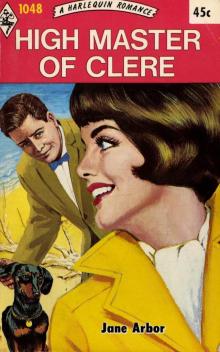 High Master of Clere
High Master of Clere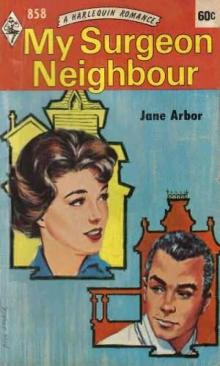 My Surgeon Neighbour
My Surgeon Neighbour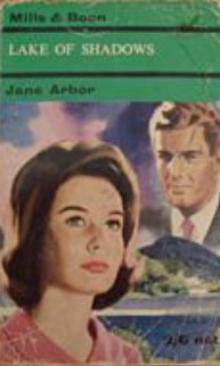 Lake of Shadows
Lake of Shadows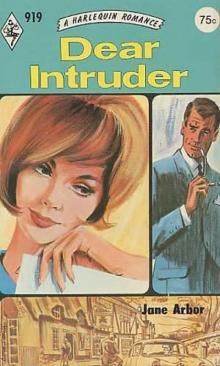 Dear Intruder
Dear Intruder Flash of Emerald
Flash of Emerald Return to Silbersee
Return to Silbersee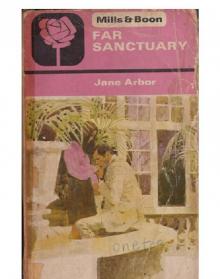 Far Sanctuary
Far Sanctuary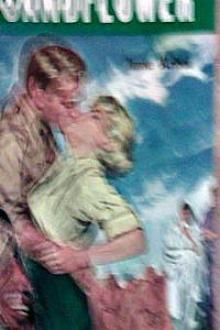 Sandflower
Sandflower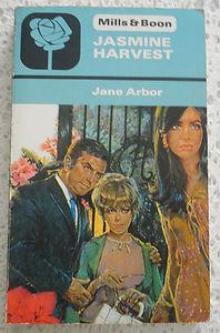 Jasmine Harvest
Jasmine Harvest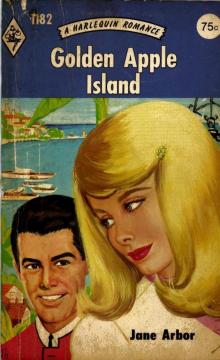 Golden Apple Island
Golden Apple Island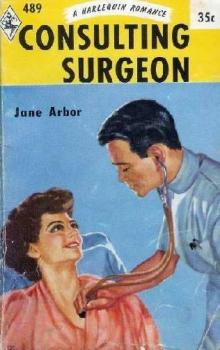 Consulting Surgeon
Consulting Surgeon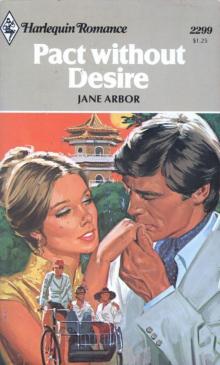 Pact without desire
Pact without desire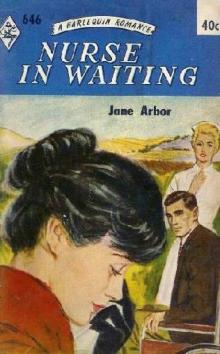 Nurse in Waiting
Nurse in Waiting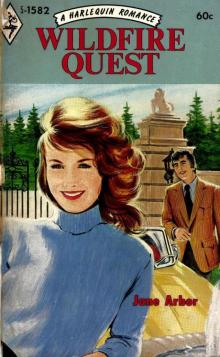 Wildfire Quest
Wildfire Quest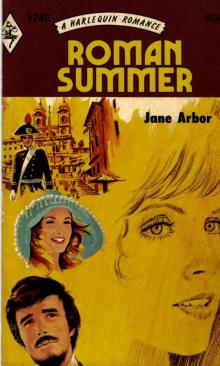 Roman Summer
Roman Summer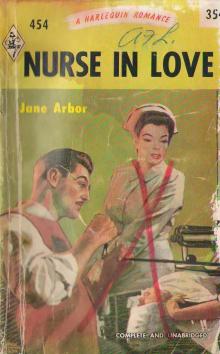 Nurse in Love
Nurse in Love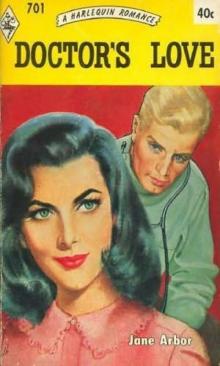 Doctor's Love
Doctor's Love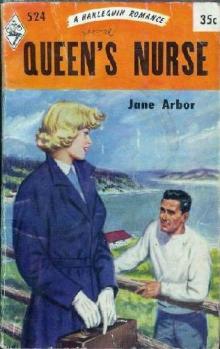 Queen's Nurse
Queen's Nurse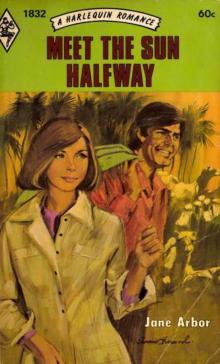 Meet the Sun Halfway
Meet the Sun Halfway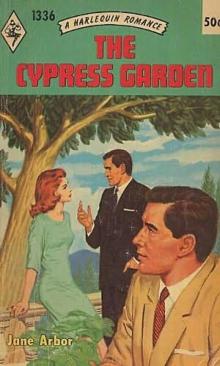 The Cypress Garden
The Cypress Garden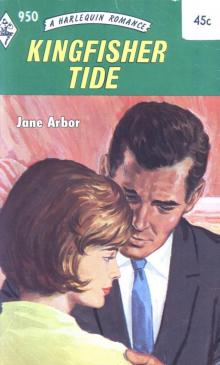 Kingfisher Tide
Kingfisher Tide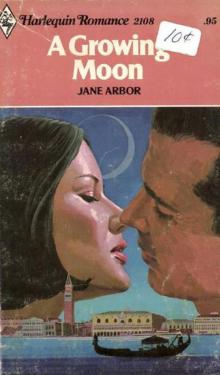 A Growing Moon
A Growing Moon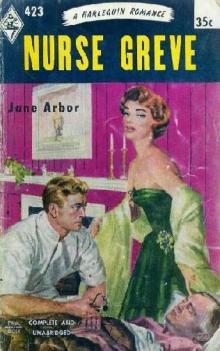 Nurse Greve
Nurse Greve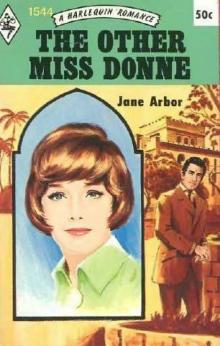 The Other Miss Donne
The Other Miss Donne